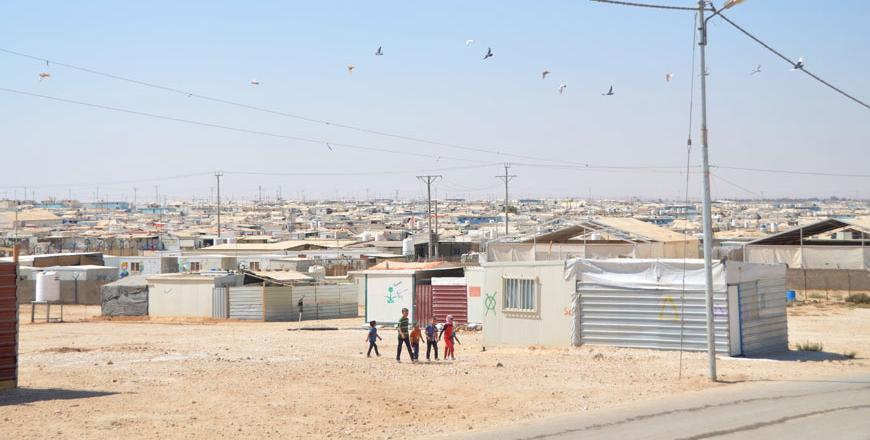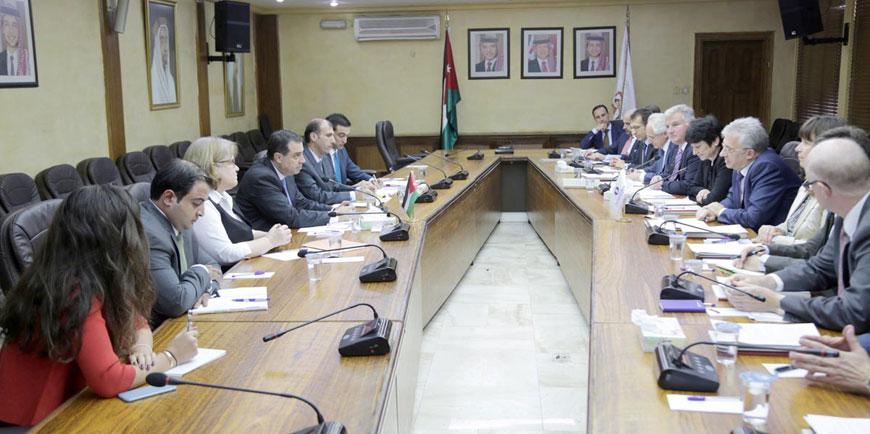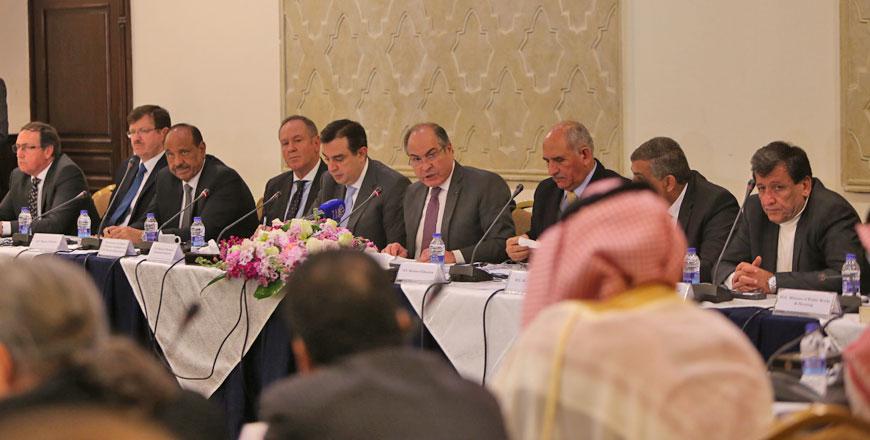You are here
Jordan demands steady international funding for refugee response plan
By Dana Al Emam - Oct 19,2015 - Last updated at Oct 19,2015

Children play at the Zaatari Refugee Camp. The Kingdom needs around $8 billion to implement the Jordan Response Plan and continue to respond to the needs of refugees in the country (JT file photo)
AMMAN — Committed and sustainable assistance by donors and the international community is "critical" for implementing the 2016-2018 Jordan Response Plan (JRP), Prime Minister Abdullah Ensour said Monday.
Ensour added that despite the international community's support, financing for the 2015 JRP has not been proportionate to actual needs, stating that "chronic aid shortages" have prevented the implementation of critical programmes for refugees and host communities.
Speaking at the eighth meeting of the Jordan Response Platform for the Syria Crisis, the premier said the second phase of the JRP represents another step towards a comprehensive response that "effectively links short-term coping solutions with longer-term initiatives aimed at strengthening local and national resilience capacities".
"I call on our partners to increase their support to Jordan so that we may continue to provide for those who seek refuge within our borders without undermining the foundations of our people’s future," he added, encouraging creative solutions towards building a prosperous environment for refugees and vulnerable Jordanians.
Minister of Planning and International Cooperation Imad Fakhoury underscored the importance of the participatory approach in the preparations for the 2016-2018 plan, adding that donors can continue providing the ministry with comments and suggestions until the end of this month.
“Adequately financing the 2016-2018 Response Plan is critical and will be urgently needed in order to ensure the continuation of international humanitarian response to refugees,” he said at the same meeting.
Fakhoury added that adequate financing will enable the government to maintain basic services to refugees and host communities at improved, rather than regressive, levels.
He noted that 167 projects were approved through the 2015 JRP to date, and are publically accessible on an online database along with concerned project activities to enhance transparency and harmonisation.
“Much has been achieved over the past year despite severe funding shortfalls,” he said, adding that over 143,000 Syrian refugee children enrolled in public schools this year and 50,000 Syrian children have been provided with remedial education.
At the same time, communicable disease control measures have resulted in vaccinating over 100,000 Syrian children under the age of five against polio.
Furthermore, access to justice has improved, with 70,000 Syrian refugees and Jordanians in host communities having obtained legal advice and/or information.
Meanwhile, United Nations Resident and Humanitarian Coordinator Edward Kallon said that the recent arrival of thousands of Syrian refugees in Europe has drawn “fresh attention” to the crisis unfolding in the region and to Jordan in particular, reawakening international concern and solidarity.
“I believe we have the opportunity to... make sure Jordan has the partners, the tools and the funds it needs to see this vision realised,” he said, highlighting the importance of delivering a “credible” plan that reflects the achievements, constraints and shortcomings of the 2015 plan.
He also suggested methods for the sustainable management of the plan, such as ensuring that sector task forces perform technical oversight and provide policy advisory services to the platform, which is hoped will help examine the type of capacity development investment the task forces need.
Another key issue is for donors is to sustain their assistance over the three year period of the plan, in addition to creating an enabling policy environment for resilience, encouraging the economic potential of refugees and providing strong incentives for private sector investment to promote productivity.
The 2016-2018 JRP seeks to build stronger linkages between humanitarian and development responses and to improve targeting of assistance based on vulnerability and through a resilience-based approach, according to the ministry.
The total cost of response interventions for the 2016-2018 plan is $8,137,444,104 (around JD5,769.5 million), including $2,450,978,299 (around JD1,737.7 million) for refugee interventions, $2,485,137,007 (around JD1,761.9 million) for resilience-strengthening of host communities, service delivery systems and public authorities, and $3,201,328,798 (around JD2,269.7 million) for specific budget support needs.
Related Articles
AMMAN — Minister of Planning and International Cooperation Imad Fakhoury on Wednesday discussed with a delegation from the European Bank for
AMMAN — The 2016-2018 Jordan Response Plan (JRP) to the Syrian crisis includes several interventions, programmes and projects that require a
AMMAN — The government and the international community on Thursday endorsed a $7.6-billion three-year Jordan Response Platform (JRP) for the


















